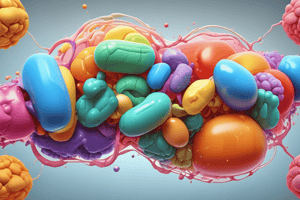Podcast
Questions and Answers
What is the primary purpose of metabolism?
What is the primary purpose of metabolism?
- To convert food into energy and essential components (correct)
- To break down large molecules into smaller ones
- To maintain a constant body temperature
- To produce carbon dioxide and water
What are the two major processes that make up metabolism?
What are the two major processes that make up metabolism?
- Carbohydrate metabolism and protein metabolism
- Degradation and biosynthesis
- Catabolism and anabolism (correct)
- Glycolysis and the citric acid cycle
What is the primary purpose of the citric acid cycle in carbohydrate metabolism?
What is the primary purpose of the citric acid cycle in carbohydrate metabolism?
- To convert fats into carbohydrates
- To transport electrons through the electron transport chain
- To break down glucose into pyruvate
- To produce ATP and carbon dioxide (correct)
What is the role of protein metabolism in the body?
What is the role of protein metabolism in the body?
What are the two main processes involved in protein metabolism?
What are the two main processes involved in protein metabolism?
What is the main process involved in breaking down dietary fats?
What is the main process involved in breaking down dietary fats?
Which process involves breaking down glucose?
Which process involves breaking down glucose?
What is the key product generated in the citric acid cycle?
What is the key product generated in the citric acid cycle?
Flashcards are hidden until you start studying
Study Notes
Metabolism
Metabolism is the set of chemical reactions that occur within cells to maintain life. It involves converting food into energy and other essential components, such as proteins, carbohydrates, fats, vitamins, minerals, and water. Metabolism can be divided into two major processes: catabolism, which breaks down molecules to release energy, and anabolism, which builds large molecules from smaller ones. The three primary nutrients that undergo metabolic processing in human cells are carbohydrates, proteins, and fats.
Carbohydrate Metabolism
Carbohydrate metabolism involves the breakdown of glucose, a form of sugar found in foods. This process happens in two stages: glycolysis and the citric acid cycle (also known as the tricarboxylic acid cycle). Glycolysis occurs in the cytoplasm of cells and produces pyruvate, which enters the mitochondria to continue the process of generating energy via the citric acid cycle. The end products of both glycolysis and the citric acid cycle are adenosine triphosphate (ATP) and carbon dioxide (CO2).
Protein Metabolism
Protein metabolism involves the breakdown of proteins, which are made up of amino acids. Proteins are essential for growth, repair, and immune function. The process of protein metabolism includes degradation, where proteins are broken down into smaller molecules, and biosynthesis, where smaller molecules are combined to form new proteins. In this process, amino acids are hydrolyzed into their constituent amino groups and carboxylic acid groups. These are then reassembled into peptide bonds to form new proteins.
Fat Metabolism
Fat metabolism involves the breakdown of dietary fats into smaller molecules called fatty acids and glycerol. This occurs through a process called lipolysis, which releases fatty acids from triglycerides stored in fat cells. Fatty acids then enter the mitochondria and undergo beta-oxidation, where they are broken down into shorter chains of acetyl-CoA molecules. These molecules enter the citric acid cycle to generate energy in the form of ATP.
In summary, metabolism plays a crucial role in maintaining life by converting food into energy and other essential components. Carbohydrate metabolism involves breaking down glucose through glycolysis and the citric acid cycle. Protein metabolism includes degradation and biosynthesis processes, while fat metabolism focuses on breaking down dietary fats through lipolysis and beta-oxidation. Understanding these processes helps explain how our bodies utilize nutrients and maintain health.
Studying That Suits You
Use AI to generate personalized quizzes and flashcards to suit your learning preferences.




